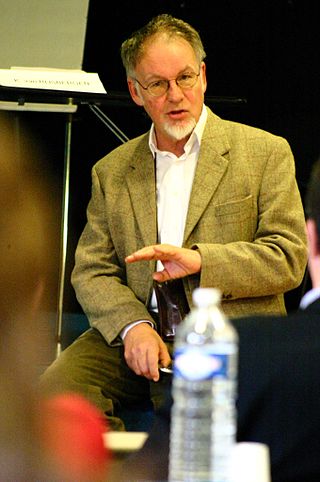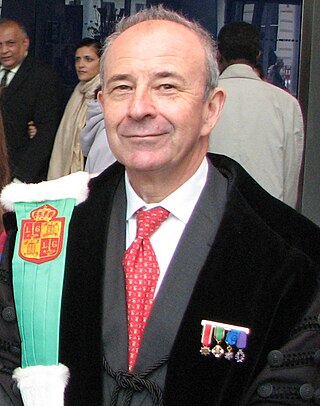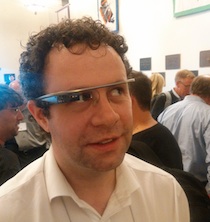Related Research Articles

Computing is any goal-oriented activity requiring, benefiting from, or creating computing machinery. It includes the study and experimentation of algorithmic processes, and development of both hardware and software. Computing has scientific, engineering, mathematical, technological and social aspects. Major computing disciplines include computer engineering, computer science, cybersecurity, data science, information systems, information technology and software engineering.

Computer science is the study of computation, information, and automation. Computer science spans theoretical disciplines to applied disciplines. Though more often considered an academic discipline, computer science is closely related to computer programming.
Information retrieval (IR) in computing and information science is the task of identifying and retrieving information system resources that are relevant to an information need. The information need can be specified in the form of a search query. In the case of document retrieval, queries can be based on full-text or other content-based indexing. Information retrieval is the science of searching for information in a document, searching for documents themselves, and also searching for the metadata that describes data, and for databases of texts, images or sounds.
Bio-inspired computing, short for biologically inspired computing, is a field of study which seeks to solve computer science problems using models of biology. It relates to connectionism, social behavior, and emergence. Within computer science, bio-inspired computing relates to artificial intelligence and machine learning. Bio-inspired computing is a major subset of natural computation.

Dublin City University is a university based on the Northside of Dublin, Ireland. Created as the National Institute for Higher Education, Dublin in 1975, it enrolled its first students in 1980, and was elevated to university status in September 1989 by statute.
The following outline is provided as an overview of and topical guide to human–computer interaction:
Human-centered computing (HCC) studies the design, development, and deployment of mixed-initiative human-computer systems. It is emerged from the convergence of multiple disciplines that are concerned both with understanding human beings and with the design of computational artifacts. Human-centered computing is closely related to human-computer interaction and information science. Human-centered computing is usually concerned with systems and practices of technology use while human-computer interaction is more focused on ergonomics and the usability of computing artifacts and information science is focused on practices surrounding the collection, manipulation, and use of information.

C. J. "Keith" van Rijsbergen FREng is a professor of computer science at the University of Glasgow, where he founded the Glasgow Information Retrieval Group. He is one of the founders of modern Information Retrieval and the author of the seminal monograph Information Retrieval and of the textbook The Geometry of Information Retrieval.
Michael S. Lew is a scientist in multimedia information search and retrieval at Leiden University, Netherlands. He has published over a dozen books and 150 scientific articles in the areas of content based image retrieval, computer vision, and deep learning. Notably, he had the most cited paper in the ACM Transactions on Multimedia, one of the top 10 most cited articles in the history of the ACM SIGMM, and the most cited article from the ACM International Conference on Multimedia Information Retrieval in 2008 and also in 2010. He was the opening keynote speaker for the 9th International Conference on Visual Information Systems, the Editor-in-Chief of the International Journal of Multimedia Information Retrieval (Springer), the co-founder of influential conferences such as the International Conference on Image and Video Retrieval, and the IEEE Workshop on Human Computer Interaction. He was also a founding member of the international advisory committee for the TRECVID video retrieval evaluation project, chair of the steering committee for the ACM International Conference on Multimedia Retrieval and a member of the ACM SIGMM Executive Committee. In addition, his work on convolutional fusion networks in deep learning won the best paper award at the 23rd International Conference on Multimedia Modeling. His work is frequently cited in both scientific and popular news sources.
Paul F. Whelan is Professor of Computer Vision at the Centre for Image Processing & Analysis, School of Electronic Engineering, Faculty of Engineering & Computing Dublin City University.

National College of Ireland (NCI) is a not-for-profit, state-aided third-level education institution in Dublin. It was founded in 1951 as a joint venture between the Jesuits in Ireland and Irish trade unions, and was originally named the Catholic Workers College, Dublin. It is now an independent higher education institution, offering full and part-time courses from undergraduate to postgraduate level, in the areas of business, computing, psychology and education.

Sami Erol Gelenbe, a Turkish and French computer scientist, electronic engineer and applied mathematician, pioneered the field of Computer System and Network Performance. Currently Professor in the Institute of Theoretical and Applied Informatics of the Polish Academy of Sciences, he is also an Associate Researcher in the I3S Laboratory and Abraham de Moivre Laboratory. Fellow of several National Academies, he Chairs the Informatics Section of Academia Europaea since 2023. His previous Professorial Chairs include the University of Liège (1974-1979), University Paris-Saclay (1979-1986), University Paris Descartes (1986-2005), NJIT (1991-93), ECE Chair at Duke University (1993-1998), University Chair Professor and Director of EECS, University of Central Florida (1998-2003), and Dennis Gabor Professor and Head of Intelligent Systems and Networks, Imperial College (2003-2019).
Informatics is the study of computational systems. According to the ACM Europe Council and Informatics Europe, informatics is synonymous with computer science and computing as a profession, in which the central notion is transformation of information. In some cases, the term "informatics" may also be used with different meanings, e.g. in the context of social computing, or in context of library science.
Learning to rank or machine-learned ranking (MLR) is the application of machine learning, typically supervised, semi-supervised or reinforcement learning, in the construction of ranking models for information retrieval systems. Training data may, for example, consist of lists of items with some partial order specified between items in each list. This order is typically induced by giving a numerical or ordinal score or a binary judgment for each item. The goal of constructing the ranking model is to rank new, unseen lists in a similar way to rankings in the training data.
Professor Brian Dominic MacCraith, is an Irish physicist who was the third president of Dublin City University (DCU) in Ireland. He joined DCU in 1986 and became president in July 2010, for a term of 10 years. After his term in office, he took up voluntary roles, including the chairs of Ireland's High-Level Task Force on COVID-19 Vaccination and Future of Media Commission.

Data science is an interdisciplinary academic field that uses statistics, scientific computing, scientific methods, processes, algorithms and systems to extract or extrapolate knowledge and insights from potentially noisy, structured, or unstructured data.
Stefano Ceri is an Italian computer engineer and professor of database management at Politecnico di Milano. He has been visiting professor at Stanford University between 1983 and 1990, and received the ACM SIGMOD Edward Codd Innovations Award in 2013.

Cathal Gurrin is an Irish Professor and lifelogger. He is the Head of the Adapt Centre at Dublin City University, a Funded Investigator of the Insight Centre, and the director of the Human Media Archives research group. He was previously the deputy head of the School of Computing.
Christopher D Paice was one of the pioneers of research into stemming. The Paice-Husk stemmer was published in 1990 and his method of evaluation of stemmer performance by means of Error Rate with Respect to Truncation (ERRT) was the first direct method of comparing under-stemming and over-stemming errors. Apart from his pioneering work on stemming algorithms and evaluation methods he made other research contributions in the area of Information Retrieval, anaphora resolution and automatic abstracting.
References
- ↑ President Welcomes New Members to the Academy Archived 21 September 2013 at the Wayback Machine - Royal Irish Academy, 31 May 2013
- ↑ "Alan Smeaton's Home Pages". computing.dcu.ie. Retrieved 3 November 2019.
- ↑ "Prof. Alan Smeaton | The Insight Centre for Data Analytics". www.insight-centre.org. Archived from the original on 3 November 2019. Retrieved 3 November 2019.
- ↑ Insight
- ↑ Professor Alan Smeaton Archived 10 November 2013 at the Wayback Machine | Centre for Sensor Web Technologies
- ↑ "Alan F. Smeaton MRIA FIEEE". Google Scholar. Retrieved 3 November 2019.
- ↑ Ahlstrom, Dick. "The professor who helps people find things". The Irish Times. Retrieved 3 November 2019.
- ↑ President Welcomes New Members to the Academy Archived 21 September 2013 at the Wayback Machine - Royal Irish Academy, 31 May 2013
- ↑ Archived 26 December 2013 at the Wayback Machine Irish Research Council.